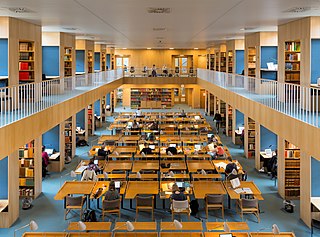
A library is a collection of materials, books or media that are accessible for use and not just for display purposes. A library provides physical or digital access materials, and may be a physical location or a virtual space, or both. A library's collection can include printed materials and other physical resources in many formats such as DVD, CD and cassette as well as access to information, music or other content held on bibliographic databases.
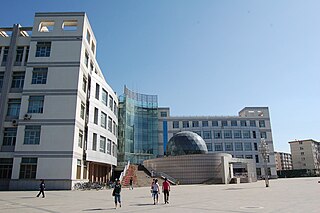
Inner Mongolia Agricultural University is a university in Hohhot, Inner Mongolia, China under the authority of the Autonomous Region government. It is in Hohhot, the capital city of Inner Mongolia Autonomous Region. It was established in 1952. There are over 100 undergraduate degree programs and postgraduate courses across a range of disciplines, including Agricultural, Engineering, Science, Art, Business, and Management.

Yeungnam University is a private research university located in Gyeongsan, North Gyeongsang, South Korea. The university's predecessors, Taegu College and Chunggu College, were founded in Daegu in 1947 and 1950 respectively. In 1967, the two colleges were merged by President Park Chung-hee to form Yeungnam University. In 1972, the university's new main campus opened in Gyeongsan east of Daegu. The university includes colleges of Law and Medicine as well as a university hospital.

The Smithsonian Tropical Research Institute is located in Panama and is the only bureau of the Smithsonian Institution based outside of the United States. It is dedicated to understanding the past, present, and future of tropical ecosystems and their relevance to human welfare. STRI grew out of a small field station established in 1923 on Barro Colorado Island in the Panama Canal Zone to become one of the world's leading tropical research organizations. STRI's facilities provide for long-term ecological studies in the tropics and are used by some 1,200 visiting scientists from academic and research institutions around the world every year.
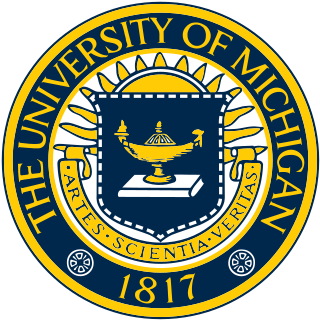
The University of Michigan Library is the academic library system of the University of Michigan and the second largest research library in the United States by volumes held.

The University of the Philippines Open University(UPOU) is a public research and open university and distance education institution headquartered in the town of Los Baños, Laguna, with satellite offices in Quezon City, Metro Manila. It is the fifth constituent university of the University of the Philippines System.
The Association for Asian Studies (AAS) is a scholarly, non-political and non-profit professional association open to all persons interested in Asia and the study of Asia. It is based in Ann Arbor, Michigan, United States. With approximately 6,000 members worldwide, from all the regions and countries of Asia and across academic disciplines, the AAS is the largest organization focussing on Asian studies.
East Asian studies is a distinct multidisciplinary field of scholarly enquiry and education that promotes a broad humanistic understanding of East Asia past and present. The field includes the study of the region's culture, written language, history and political institutions. East Asian Studies is located within the broader field of Asian studies and is also interdisciplinary in character, incorporating elements of the social sciences and humanities, among others. The field encourages scholars from diverse disciplines to exchanges ideas on scholarship as it relates to the East Asian experience and the experience of East Asia in the world. In addition, the field encourages scholars to educate others to have a deeper understanding of and appreciation and respect for, all that is East Asia and, therefore, to promote peaceful human integration worldwide.
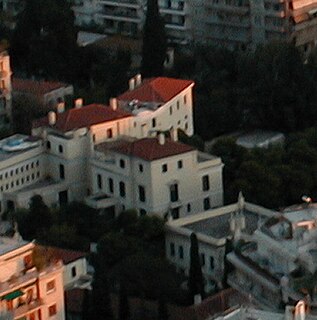
The American School of Classical Studies at Athens (ASCSA) is one of 19 foreign archaeological institutes in Athens, Greece. It is a member of the Council of American Overseas Research Centers (CAORC). CAORC is a private not-for-profit federation of independent overseas research centers that promote advanced research, particularly in the humanities and social sciences, with focus on the conservation and recording of cultural heritage and the understanding and interpretation of modern societies.

An academic library is a library that is attached to a higher education institution and serves two complementary purposes: to support the curriculum and the research of the university faculty and students. It is unknown how many academic libraries there are worldwide. An academic and research portal maintained by UNESCO links to 3,785 libraries. According to the National Center for Education Statistics, there are an estimated 3,700 academic libraries in the United States. In the past, the material for class readings, intended to supplement lectures as prescribed by the instructor, has been called reserves. In the period before electronic resources became available, the reserves were supplied as actual books or as photocopies of appropriate journal articles. Modern academic libraries generally also provide access to electronic resources.
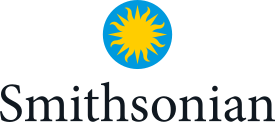
Smithsonian Libraries and Archives is an institutional archives and library system comprising 21 branch libraries serving the various Smithsonian Institution museums and research centers. The Libraries and Archives serve Smithsonian Institution staff as well as the scholarly community and general public with information and reference support. Its collections number nearly 3 million volumes including 50,000 rare books and manuscripts.
The Center for Homeland Defense and Security at the Naval Postgraduate School (NPS) in Monterey, California is a school focusing on homeland security education.
The American Research Center in Egypt (ARCE) is a scholarly institution dedicated to supporting the conservation of Egyptian antiquities and research in Egyptology, Coptology, and all periods of Egyptian history. The center is a member of the Council of American Overseas Research Centers (CAORC). Previous and current 990 forms that detail the organization's financial holdings and the compensation of its Executive Director and other key personnel are available to the public.

The Center for Khmer Studies is a private American Overseas Research Center working to promote research, teaching and public service in the social sciences, arts and humanities, as they are related to Cambodia and the Mekong region. CKS also aims to connect Cambodian scholars, students and artists with their international colleagues for the purposes of fostering understanding of Cambodia and Southeast Asia.
The Technological Innovation and Cooperation for Foreign Information Access (TICFIA) grant program is a United States Department of Education Title VI grant program that provides grants to develop innovative techniques or programs that address national teaching and research needs in international education and foreign languages by using technology to access, collect, organize, preserve, and widely disseminate information on world regions and countries other than the United States.
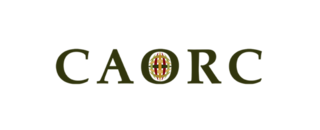
The Council of American Overseas Research Centers (CAORC) is a private not-for-profit association of centers that research, conserve and record cultural heritage and modern societies. CAORC, founded in 1981, helps arrange research projects that span national boundaries, in which member centers collaborate.
The National Coalition of Independent Scholars (NCIS) is the principal professional association for independent scholars. Incorporated in the USA but now with an international membership, NCIS is a non-profit organization that supports independent scholars, defined as someone who is actively pursuing knowledge in an academic or scientific discipline, without secure employment in or support from an academic institution. Independent scholars include unaffiliated scholars, adjunct professors and part-time faculty, graduate students, research professionals, artists, and curators. NCIS enables scholars working in the arts, humanities, social sciences and STEM fields to access and share resources, such as library access, and support, which are typically unavailable to researchers who are not affiliated with a university or other institution.
The American Center of Research (ACOR) is a private, not-for-profit academic institution & consortium, research library, and hostel. Based in Alexandria, Virginia, with a facility in Amman, Jordan, ACOR promotes the study of the MENA region, with an emphasis on the past and present of Jordan. The institution is a member of the American Schools of Oriental Research (ASOR) and the Council of American Overseas Research Centers (CAORC). Prior to 2020, ACOR was known as The American Center of Oriental Research.

The Latin American Council of Social Sciences (CLACSO) is an international non-governmental institution, created in 1967 from an initiative of UNESCO, an institution in which it has Associative status. Currently, it brings together 680 research centers and postgraduate programs in various fields of the social sciences and humanities, located in 51 countries in Latin America and the Caribbean, as well as in the United States, Africa and Europe. Its headquarters are in Buenos Aires, Argentina. The current executive secretary of the organization is Karina Batthyány.

The Library of the Economic Commission for Latin America and the Caribbean was established in 1948 as part of the creation of the Economic Commission for Latin America and the Caribbean; this coincided with the inauguration of the Economic Commission for Latin America by the United Nations, in support of its mandate in the region. The Library has four branches: the Hernán Santa Cruz Library in Santiago, the Centro de Recursos de Información y Distribución de Documentos in México D.F., the Raúl Prebisch Library in Brasilia and the Caribbean Knowledge Management Centre in Port of Spain. These four form the ECLAC Library.













